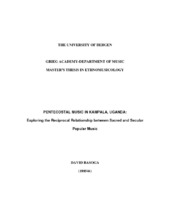Pentecostal music in Kampal, Uganda. Exploring the reciprocal relationship between sacred and secular
Master thesis
Permanent lenke
https://hdl.handle.net/1956/7145Utgivelsesdato
2010-11-22Metadata
Vis full innførselSamlinger
Sammendrag
Abstract In this study, I explore particular aspects in which the relationship between Pentecostal music and secular music has become prominent in Kampala, Uganda. Particularly, I examine how Pentecostal music artists have drawn inspirations from secular popular music scene particularly in the style of singing, dance movement, recording, marketing and the general performance context. The study examines the nature of Pentecostal music introduced by the European missionaries, the process of making Pentecostal music, and tries to establish the factors responsible for the similarities between Pentecostal music and secular popular music. The study seeks to find out the meaning and significance of the changing Pentecostal music to a popular style. It also traces the origin and growth of Pentecostalism and its sacred music, focusing on how this sacred music has changed over time specifically in Uganda. This ethnographic study has been developed using research findings, literature related to Pentecostal movements in Uganda and Pentecostalism in general, Pentecostal music and the secularization and sacralization processes. The study indentifies the actors of Pentecostal music and examines the artistic role each plays. In this study, I also outline a number of factors responsible for this emerging genre among them prayer, evangelization, income earning, entertainment, music awards together with the health and economic problems experienced by ordinary Ugandans as some of the issues addressed by Pentecostal music lyrics. In the conclusion, the diversity of Pentecostal churches in Kampala, in relation to acculturation and commercialization are identified as key factors in the shaping of the secularization and sacralization processes. Similarly, the study shows that sacralization and secularization are complementary processes. Abstract In this study, I explore particular aspects in which the relationship between Pentecostal music and secular music has become prominent in Kampala, Uganda. Particularly, I examine how Pentecostal music artists have drawn inspirations from secular popular music scene particularly in the style of singing, dance movement, recording, marketing and the general performance context. The study examines the nature of Pentecostal music introduced by the European missionaries, the process of making Pentecostal music, and tries to establish the factors responsible for the similarities between Pentecostal music and secular popular music. The study seeks to find out the meaning and significance of the changing Pentecostal music to a popular style. It also traces the origin and growth of Pentecostalism and its sacred music, focusing on how this sacred music has changed over time specifically in Uganda. This ethnographic study has been developed using research findings, literature related to Pentecostal movements in Uganda and Pentecostalism in general, Pentecostal music and the secularization and sacralization processes. The study indentifies the actors of Pentecostal music and examines the artistic role each plays. In this study, I also outline a number of factors responsible for this emerging genre among them prayer, evangelization, income earning, entertainment, music awards together with the health and economic problems experienced by ordinary Ugandans as some of the issues addressed by Pentecostal music lyrics. In the conclusion, the diversity of Pentecostal churches in Kampala, in relation to acculturation and commercialization are identified as key factors in the shaping of the secularization and sacralization processes. Similarly, the study shows that sacralization and secularization are complementary processes.
